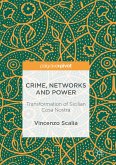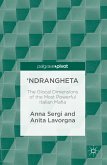Drawing upon meticulous ethnographic fieldwork conducted in Israel between 2020 and 2024, alongside rigorous media analysis, interviews conducted both domestically and internationally, and a wealth of visual material captured by the author during fieldwork, this study offers unparalleled insights into the dynamics of Israel's underworld. It examines the multifaceted activities of various criminal organizations, including but not limited to drug and human trafficking, protection rackets, gambling enterprises, and contract killings.
Moreover, this book critically examines the responses of authorities and law enforcement agencies to the escalating influence of organized crime amidst the backdrop of major socio-political upheavals in Israel, ranging from wars and waves of immigration to terrorist attacks. By contextualizing these criminal phenomena within broader historical and contemporary narratives, this work not only fills a significant gap in scholarly discourse but also provides a nuanced understanding of the intersections between crime, society, and governance in the Israeli context.
Dieser Download kann aus rechtlichen Gründen nur mit Rechnungsadresse in A, B, BG, CY, CZ, D, DK, EW, E, FIN, F, GR, HR, H, IRL, I, LT, L, LR, M, NL, PL, P, R, S, SLO, SK ausgeliefert werden.









